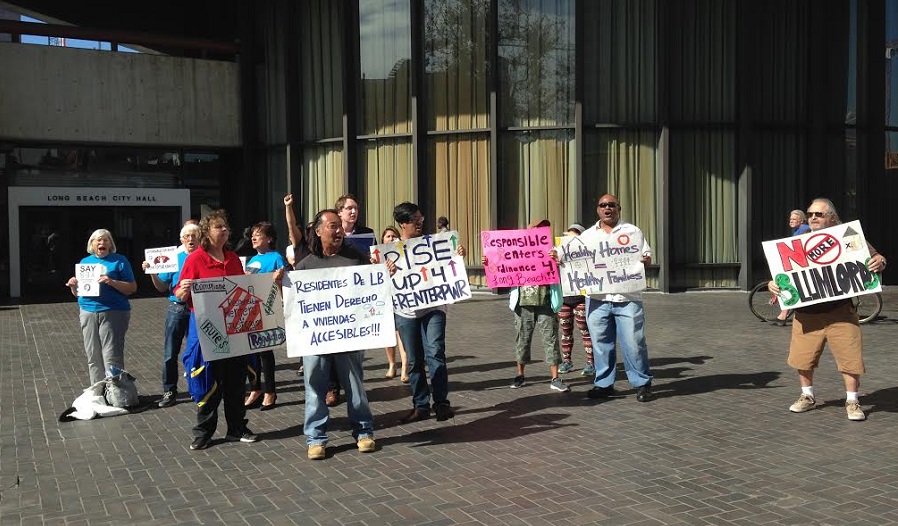
Community members demonstrate in front of City Hall last November in support of rent control. File photo by Stephanie Rivera.
As a local tenants’ rights organization works on getting rent control on the ballot in Long Beach, two housing groups have expressed their opposition to the issue, and in the process revealed that the entire city council along with the mayor share their stance.
In a city that is composed of about 60 percent renters and represented by multiple moderate and left-leaning Democratic politicians with a history of favoring labor groups, this news may be surprising, but in fact, all of the council members have at one point in time joined the mayor in opposing rent control.
In a statement released Friday, Pacific West Association of Realtors (PWR) thanked “locally elected city officials who have opposed this misguided policy. Mayor Garcia and the entire Long Beach Council have expressed to us verbally or in writing their opposition to rent control.”
When asked about those statements, a PWR official provided the Post with responses by seven council members who filled out PWR questionnaires when they were seeking their support as city council candidates in 2015-16.
When asked if government should regulate rental rates, Councilmembers Daryl Supernaw, Jeannine Pearce, Dee Andrews, Al Austin, Suzie Price, Stacy Mungo, Vice Mayor Rex Richardson and Mayor Robert Garcia all said no.
Some council members elaborated on their responses, with Austin stating the need for adequate housing stock at different income levels and Richardson suggesting that the government should only regulate rental rates when it owns or subsidizes property.
The vice mayor also suggested the need to explore incentives to explore affordable housing stock. Price said rent control programs lead to abuse and poor property maintenance when there is no incentive to keep them up. She also noted that there are “many rental rate programs for lower income individuals.”
The Post reached out to all council members to confirm their current stances on rent control.
Supernaw confirmed he is still opposed.
Seventh District Councilman Roberto Uranga, who didn’t provide a written statement to PWR, said he sees rent control as a last resort for a city that has not taken care of its housing needs.
“Rent control initiatives prove we have an issue with housing and affordability, and I would prefer that we fix it through negotiation like some sort of just cause eviction,” Uranga told the Post in an email.
As efforts are underway to put rent control on the ballot, Pearce said it will be up to the voters to decide but noted that other options should be explored.
“Rent control is not a black and white issue, and we need to make sure that we are looking at every possible tool in the toolbox as we move forward to address our housing crisis,” Pearce said in an email to the Post.
The rest of the council members were either not available to comment at the time of publication or did not respond to requests for comment.
Yesterday Apartment Association, California Southern Cities (AACSC) released its own statement opposing rent control, similar to that of PWR.
Both PWR and AACSC called the potential measure that “an organization that is largely funded with money from outside the city is attempting to place” on the ballot is harmful to local property owners and tenants, stating rent controlled cities are typically the most expensive in the country.
Responding to PWR and AACSC’s statements, Housing Long Beach (HLB) Executive Director Josh Butler—who is behind the proposed rent control measure—said opponents of rent control “misrepresent the relationship between rent control measures and the cost of living without explaining underlying market factors such as rampant real estate speculation and unregulated development.”
“Corporate development is changing what our city looks like,” Butler said. “New, higher income tenants have moved in raising rents, pricing out longtime residents, and forcing them to leave their homes. This is what gentrification looks like. Rent control prevents mass displacement, helps tenants stay and invest in their community, and helps build social capital for all. We have great treasures here in Long Beach right now, and we need to keep those treasures.”
Butler said the city officials’ positions on rent control has been known a long time which is why HLB is working to get the issue to the voters directly.
“We have conducted polling that shows overwhelming support amongst Long Beach voters for rent control,” Butler told the Post. “We hope that our elected officials are open minded and at least willing to discuss the issue.”
As for PWR and AASCS’s comments on HLB’s outside funders, Butler said over the last 12 months HLB’s biggest funders have been the California Endowment and NextGen America and is proud to have their support. He pointed to the fact that both PWAR and AASCS recently hosted a fundraiser at $800 a person for the mayor and “understandably they have a lot invested in this issue.”
“To date, Long Beach renters have experienced some of the fastest rising rents in the country,” Butler said. “So, I’d say the landlords and realtors have been doing pretty well.”
Currently, the city attorney’s office is working on the ballot title and summary for the rent control measure. Once that is complete it will then be submitted to the city clerk’s office.

